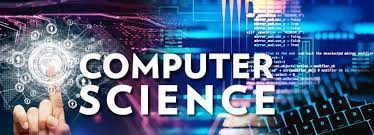
Computer Science is an on-demand course globally. The evolution of technology, the penetration of the internet and the outbreak of COVID-19 pandemic has further amplified the desire for Computer or IT related disciplines.
The application of computer technology has become almost inevitable in all spheres of life as the world moves towards digitalization. Several innovations in the computing world are helping humanity to solve emerging problems across different fields such as communication, data management, research, business, training, aviation, medicine, security, education, manufacturing, economy, marketing and law.
Just recently, computer software and models were used to predict COVID-19 dynamics and many hardware and software applications are being developed to make life easier for people especially persons with special needs.
Computer literacy has become one of the “must have” skills for all potential and existing employees who want to be competitive in a changing world of works. In fact, most employers now include computer skills as of the major requirements for employment. Computer science is run as a Certificate, Diploma or Degree programme in most educational institutions and it is designed to equip the learners with 21st century computing knowledge and skills (both on software and hardware) needed to enhance their competences, creativity and employability skills. Many educational institutions also include “Introduction to Computer science (CSC 101)” as one of the compulsory General Study Courses (GSTs) that students irrespective of their various programmes are required to complete before their graduation from school.
Computer scientists play a key role in technology development. Over the years, computer science educators have trained and mentored young technopreneurs, soft/hardware engineers and researchers who are now big players in various fields. However, the continuous changes in technology have caused paradigm shifts in Computer science education, both in terms of content and methodology.
These changes have led to constant reviews of Computer science curriculums across different levels of education. Many educational institutions are now faced with the challenges of adjusting their mode of instructions and curriculums to accommodate emerging topics in computing and modern-day realties. Some of the current topics in computing science include; Internet of Things (IoT), Machine learning, Cybersecurity, Blockchain, Big data, Bioinformatics, Quantum and Distributed computing, Human Computer Interaction (HCI), Robotics, Augmented/Virtual Reality, Nanotechnology, Software Engineering, Technology law, Human/Net-Centric Computing, Cloud Computing, Artificial Intelligence, Networking, computer graphics, Python programming, 3/4-D printing, Data Science/Analytics, Survey and sequential programming, Green computing, Semantic technology, Voice technology, Neuromorphic computing, Brain computing and vision computing. The scope of computer science will constantly evolve in line with emerging trends and realities in technology and education.
Computing is part of everything we do!
Computing is a green/on-demand course and graduates of computer science can work anywhere.
Expertise in computing enables you to solve complex, challenging problems.
Computing enables you to make a positive difference in the world.
Computing offers many types of lucrative careers.
Computing jobs are here to stay, regardless of where you are located.
Expertise in computing helps even if your primary career is something else.
Computing offers great opportunities for true creativity and innovativeness.
Computing has space for both collaborative work and individual effort. Computing is an essential part of well-rounded academic preparation.
Future opportunities in computing are without boundaries
The Computer science degree program at Coal City University is four-year program. It explores the entire computer architecture and how its different components are intertwined. In particular, the degree program is a comprehensive study of the applications of computer science in modern scientific and technological contexts. Our students study the design, development and analysis of software and hardware used to solve problems in a variety of business, scientific and social contexts.
At the end of program, our graduates are expected to become problem solvers and experts in different areas of computing. They are also awarded a Bachelor of Science (B.Sc.) degree in Computer Science. The Computer science program at Coal City University is fully accredited by the National Universities Commission (NUC) and has since graduated students who have also gone for the National Youth Service Corps (NYSC) and are now competing favorably in the industry. Our curriculum is focused on areas that could enhance students’ creativity, problem-solving skills and employability after graduation from school. Our curriculum emerging areas in computing including: Python programming, Data science/Analytics, Computer networking, Software Engineering and Development, Cyber/IT Security, Computer graphics/Animations, Robotics, Blockchain, Big data, AI/Machine learning, Mobile application development, and other emerging topics in computing. Consequently, we often recommend these areas for our students during their internship exercise which is a core part of the program. Our Six months internship program enables our students to acquire industry-based experiences, increase their competencies and enhance their employability skills and self-actualization after school.
We also have a well-equipped computer laboratory for robust practical sessions, while our classrooms are well equipped with multimedia facilities. Also, part of the benefits that our students enjoy is the exposure to different opportunities that enable would enhance their smooth transition and competitiveness after graduation. These among other things include professional courses such as:
• CISCO Certified Network Associate (CCNA)
• Certified Information Security Manager (CISM)
• Project Management Professional (PMP)
• Certified in Risk and Information Systems Control (CRISC)
• Certified Information System Security Professional (CISSP)
• ITIL Foundation Certification
• Google Certified Professional (GCP) – Cloud Architect and
• Oracle Certification Courses etc
Computer science degrees are some of the most popular study programmes worldwide. If you’re passionate about computer hardware and software, you might already know that degrees in Computer science or any IT related disciplines would lead to rewarding and lucrative careers. Becoming a computer scientist would make you one of the people who work on innovations that will take humanity forward.
Edeh, Director, ICT/ Head of Department, Mathematics and Computer Science, Coal City University, Enugu wrote via viamichael.edeh@ccu.edu.ng.